Are you looking for a healthier alternative to regular chocolate with many of the same benefits? Dark chocolate may be just what you need! With its lower sugar content, it has been found to reduce cholesterol levels and bring a high range of minerals like iron and zinc plus vitamins. But does dark chocolate have caffeine? In this blog post, we’ll discuss how much caffeine is in dark chocolate, its potential health benefits, and some tips on choosing the best kind when shopping for your next sweet treat. Keep reading to find out all about why dark chocolate might be right up your alley.
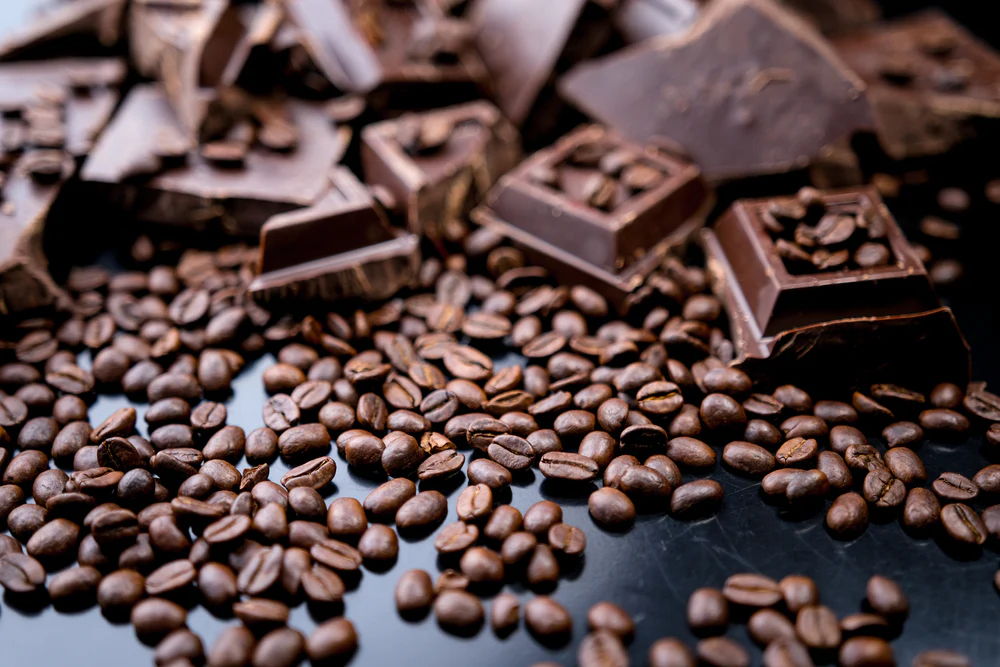
Contents
What Is Dark Chocolate?
Before we get into the details of does dark chocolate have caffeine, let’s start by looking at what it is. Dark chocolate is a type of chocolate that has been minimally processed and contains higher concentrations of cocoa solids, cocoa butter, and sugar. This means dark chocolate has higher levels of antioxidants, minerals, fiber, and other beneficial compounds than milk or white chocolates. Dark chocolate also tends to be lower in added sugar, fat, and calories.
But does dark chocolate contain caffeine? The short answer is yes, but the amount of caffeine in dark chocolate really depends on its cocoa content. Generally speaking, the higher the percentage of cocoa a type of dark chocolate contains, the more caffeine it will have. For example, a 70% dark chocolate bar may contain up to 20 milligrams of caffeine, while a 90% dark chocolate bar can have as much as 50 milligrams of caffeine.
Does Dark Chocolate Have Caffeine?
The answer is yes, dark chocolate does contain caffeine, but the amount of caffeine in dark chocolate varies depending on the cocoa content. It’s important to note that many people who are sensitive to caffeine can get a slight pick-me-up from eating dark chocolate without feeling any negative side effects.
Although darker chocolates have higher levels of beneficial compounds, it’s important not to overindulge. Eating too much dark chocolate can lead to stomach discomfort, excessive caffeine consumption, and increased risk for tooth decay. Also, while dark chocolate may contain more beneficial compounds than milk or white chocolate, this doesn’t mean it is good for you in large quantities.
Let’s watch this video to know more about does dark chocolate have caffeine.
How Much Caffeine In Dark Chocolate?
The amount of caffeine in dark chocolate depends on its cocoa content. Generally speaking, the darker the chocolate, the more caffeine it contains. A 70% dark chocolate bar may contain up to 20 milligrams of caffeine, while a 90% dark chocolate bar can have as much as 50 milligrams. Therefore, dark chocolate is not the same as coffee or tea when it comes to caffeine content.
Factors Affect The Caffeine Content In Dark Chocolate
The caffeine content in dark chocolate can also vary depending on other factors. For example, the amount of cocoa used, the length of time that it is dried and roasted, and even the type of beans used can all affect the amount of caffeine in a particular bar or block. Additionally, some manufacturers use decaffeinated chocolate chips to make their products more affordable.
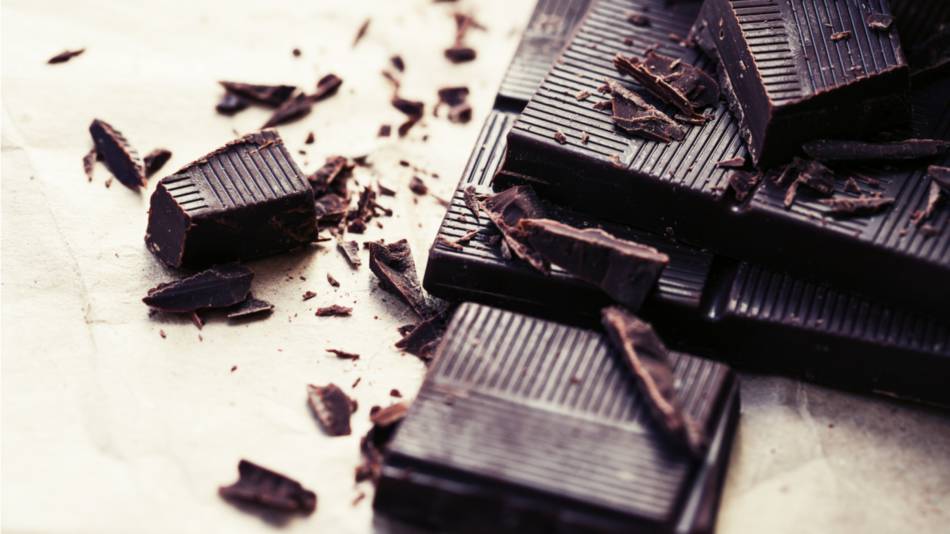
How To Determine Caffeine In Dark Chocolate?
If you are looking for a way to determine the amount of caffeine in a dark chocolate bar, there are several methods you can use. One of the easiest is to look on the package for information about how much caffeine is contained per serving. If that isn’t available, another method is to do your own research and compare different brands and types of dark chocolates.
How Much Caffeine In Dark Chocolate By Brands?
It’s important to remember that the amount of caffeine in dark chocolate can vary from brand to brand. For example, a bar of Godiva 72% Dark Chocolate contains about 18 milligrams of caffeine, while Endangered Species 88% Dark Chocolate contains an estimated 35-40 milligrams. Therefore, it is best to read the label and do research before consuming dark chocolate to determine how much caffeine it contains.
Overall, dark chocolate does contain some caffeine but in significantly lower amounts than coffee and tea. Additionally, many people who are sensitive to caffeine can get a slight pick-me-up from eating dark chocolate without feeling any negative side effects. Therefore, dark chocolate is an excellent snack choice for those looking for a healthy boost of energy.
Caffeine In Dark Chocolate Compared To Other Chocolate Types
When comparing dark chocolate to other types of chocolate, it’s important to remember that not all chocolates are created equal. While dark chocolate has higher levels of beneficial compounds and lower amounts of added sugar, fat, and calories than milk or white chocolates, this doesn’t mean it is necessarily the healthiest option.
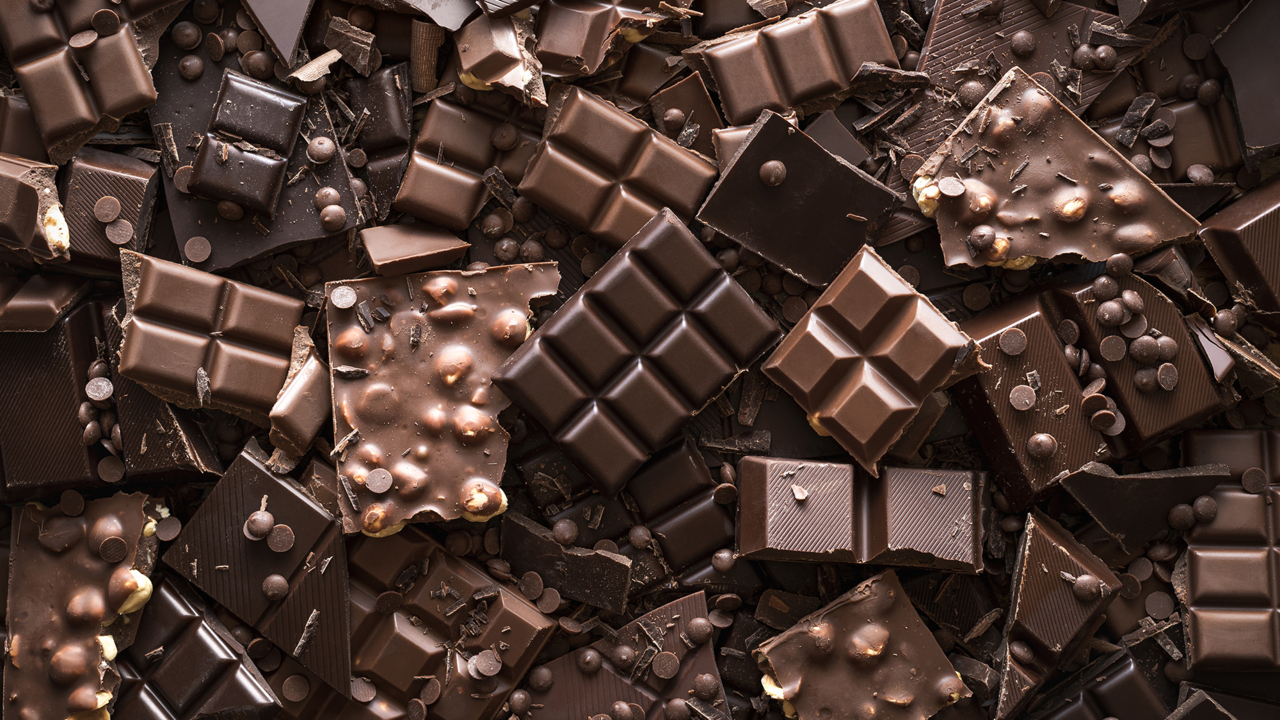
Caffeine In Dark Chocolate Compared To Coffee And Tea
When it comes to caffeine content, dark chocolate should not be compared to coffee or tea. While coffee and tea can contain up to 200 milligrams of caffeine in a single cup, the highest concentration of caffeine found in dark chocolate is only 50 milligrams. Therefore, dark chocolate is not an effective substitute for coffee or tea when it comes to achieving a caffeine boost.
Benefits Of Eating Dark Chocolate
Despite its higher caffeine content, dark chocolate has other benefits that can outweigh the potential risks. Dark chocolate is rich in antioxidants which help protect your body from damage caused by free radicals. Additionally, dark chocolate contains a good amount of dietary fiber and minerals such as iron and magnesium, which are important for overall health and wellness. Lastly, dark chocolate has been linked to several health benefits such as improved heart health, lower cholesterol levels, and improved cognitive function.
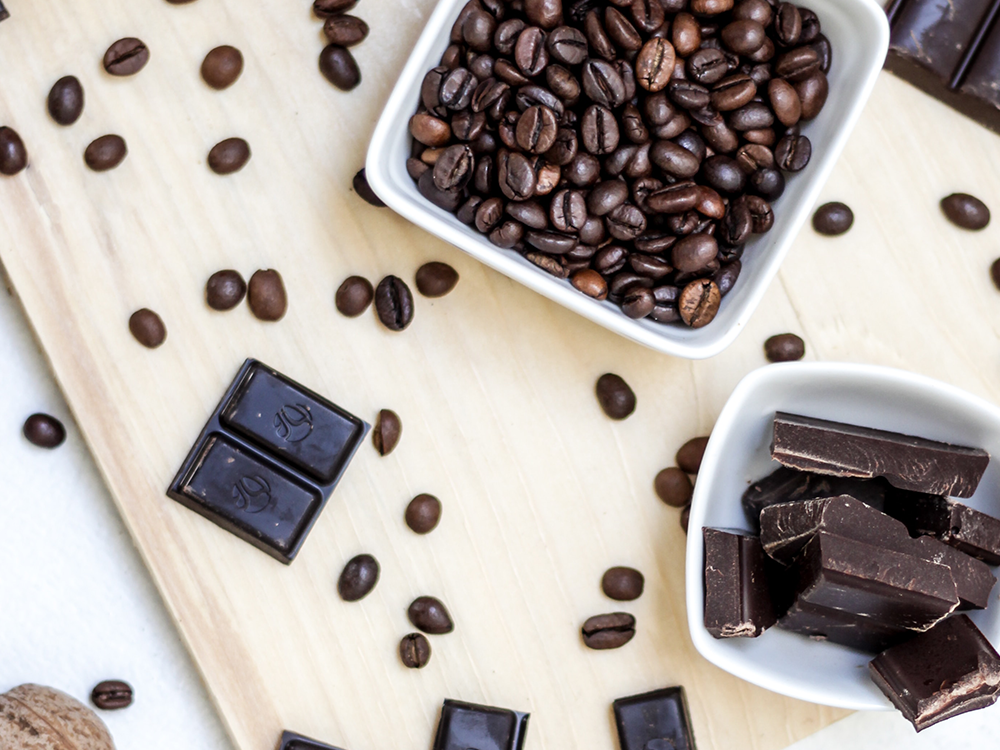
Can Caffeine In Dark Chocolate Cause Negative Side Effects?
While dark chocolate can provide many beneficial compounds and even a slight boost of energy, it’s still important to enjoy in moderation. Eating too much dark chocolate can lead to stomach discomfort, excessive caffeine consumption, and increased risk for tooth decay. Additionally, the amount of caffeine contained in dark chocolate may not be suitable for those with certain medical conditions or who are sensitive to caffeine. If you are unsure, it’s best to consult your doctor before consuming dark chocolate in larger quantities.
Negative Effects Of Eating Too Much Dark Chocolate
While dark chocolate does have many beneficial compounds and can even provide a slight pick-me-up, it’s important to remember that there are still risks associated with consuming too much. Eating large amounts of dark chocolate can lead to stomach discomfort or excessive caffeine consumption, which can cause negative side effects such as jitters, anxiety, and insomnia. Additionally, eating too much dark chocolate can increase the risk for tooth decay, as it contains high levels of sugar and acid.
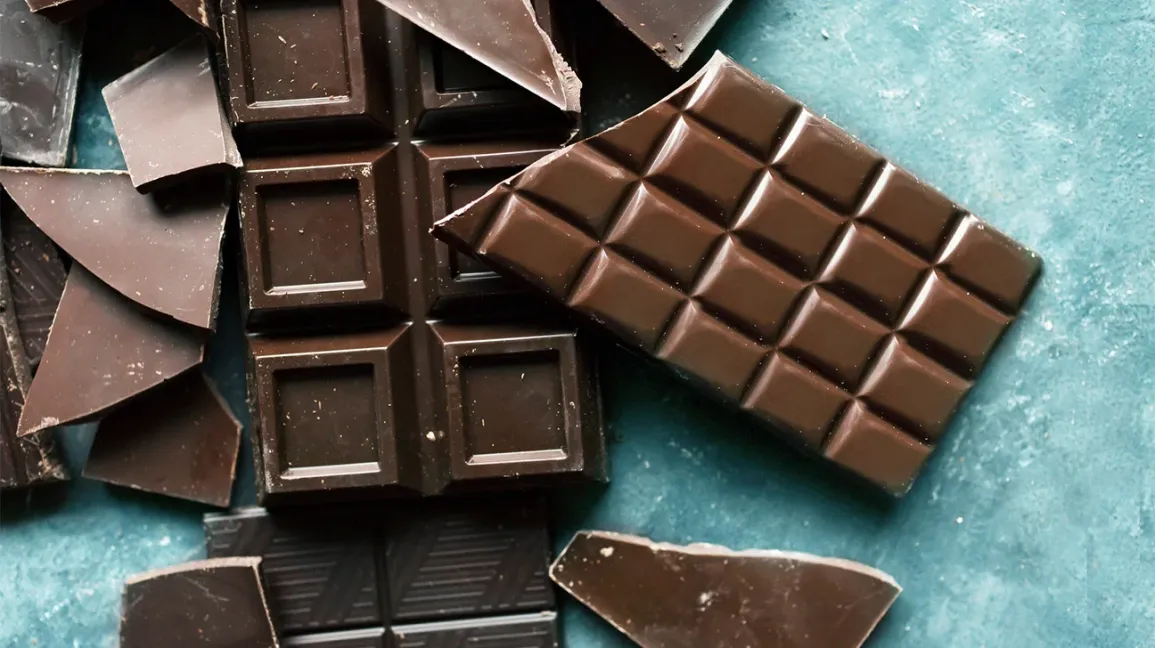
How To Eat Dark Chocolate Safely?
When it comes to eating dark chocolate, moderation is key. Eating small amounts of dark chocolate can provide a balanced boost of energy and beneficial compounds without any negative side effects. Additionally, pairing dark chocolate with other healthy foods such as nuts or fruit can help further balance the potential risks associated with excessive consumption. By following these tips, you can safely enjoy dark chocolate while reaping its many health benefits.
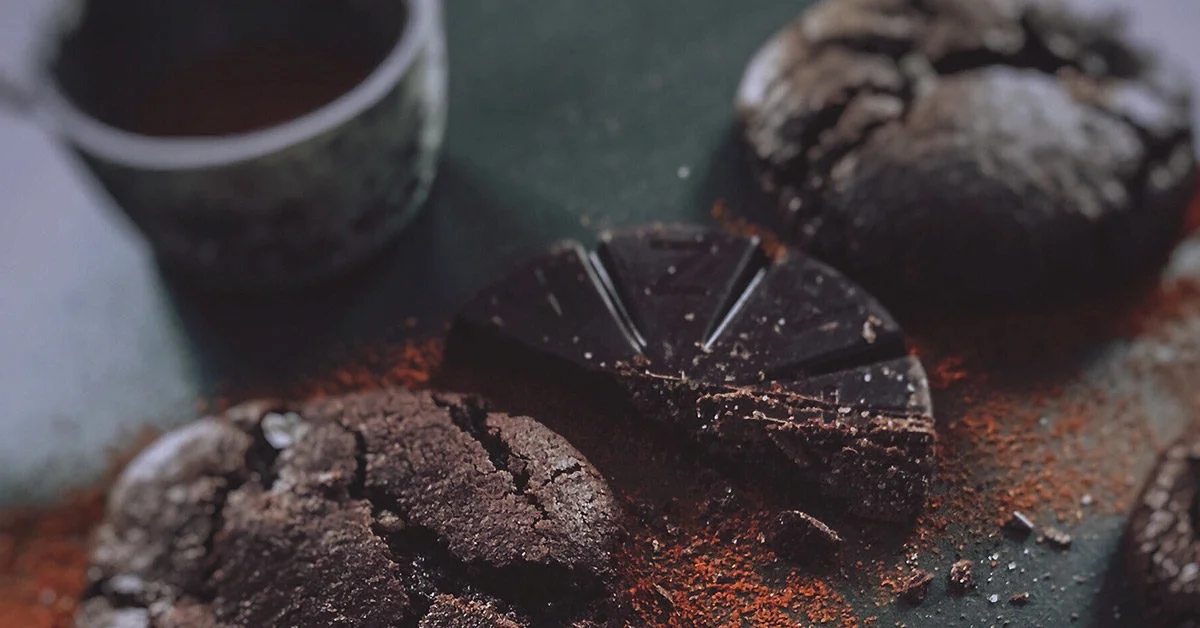
Conclusion: Does Dark Chocolate Have Caffeine?
So we have answered the question does dark chocolate have caffeine. For those who are looking to enjoy the health benefits and delicious taste of dark chocolate without worrying about caffeine intake, it’s important to check the ingredients list and make sure that nothing is added outside of cocoa solids. Furthermore, take into account storage tips like storing away from strong odors and refrigerating or freezing when needed. With proper care and attention, you can keep your dark chocolate fresh and flavorful for longer. Thank you for reading at yongkangstreetnyc.com.
FAQs: Dark Chocolate Have Caffeine
Is there more caffeine in dark chocolate than coffee?
While some dark chocolates, like Ecuadorian 100% dark chocolate, can have caffeine levels similar to a shot of espresso, in general, chocolate contains significantly less caffeine than coffee.
Does 85% dark chocolate contain caffeine?
In a 1-ounce serving (28 grams) of dark chocolate with 70-85% cocoa content, you can expect to find approximately 20-60 milligrams of caffeine. On the other hand, a 1-ounce serving (28 grams) of milk chocolate typically contains about 6-20 milligrams of caffeine.
Is there a dark chocolate without caffeine?
While true caffeine-free chocolate from cocoa beans is not available, there are some alternatives. Consider trying imitation chocolate bars made from carob or soy, which contain no caffeine.
Is 90% dark chocolate high in caffeine?
When it comes to generic dark chocolate, data from the USDA reveals the following caffeine content per 100g: 70-85% dark contains 80 mg, 60-69% dark contains 86 mg, and 45-59% dark contains 43 mg.
Is there caffeine in dark chocolate vs tea?
When it comes to determining if chocolate is safe for kids, the decision ultimately lies with you. However, it’s worth noting that a few pieces (15 g) of dark chocolate contain approximately the same amount of caffeine as a cup of green tea or decaffeinated coffee (2-6 mg). In comparison, a small cup of black coffee typically contains 80-100 mg of caffeine.
How much caffeine is in a cup of dark chocolate?
The level of caffeine in dark chocolate varies based on the amount of cocoa used. As a rule of thumb, a standard serving of dark chocolate (25g) typically contains around 20mg of caffeine.
How much caffeine is in 100g of 70% dark chocolate?
Take note, with the USDA nutrition analysis, it has been determined that this type of chocolate contains 80mg of caffeine per 100 grams.
How much caffeine is in Lindt 95 dark chocolate?
Get your caffeine fix with Lindt 95% dark chocolate. Indulge in the rich, intense flavor while enjoying a modest dose of caffeine. With approximately 20mg of caffeine per 30g serving, this dark chocolate offers a perfect balance. In comparison, a typical cup of coffee contains anywhere from 80mg to 155mg of caffeine. Choose Lindt 95% dark chocolate for a satisfying treat with a touch of caffeine.
Does 95% dark chocolate have caffeine?
While 95% dark chocolate does contain more caffeine than milk chocolate, the amount is still relatively low. To achieve the same stimulating effect as a regular cup of coffee, you would need to consume four bars of dark chocolate.
Can dark chocolate have caffeine keep you awake?
While some believe that dark chocolate can help keep you alert due to its caffeine content, it’s important to note that the amount of caffeine in dark chocolate is actually quite low. As a result, its impact on keeping you awake is unlikely to be significant.
Is dark chocolate have caffeine good for you?
Packed with disease-fighting antioxidants, dark chocolate has been shown to lower blood pressure and decrease the likelihood of heart disease. When consumed in moderation and free from excessive sugar and saturated fat, dark chocolate can be a truly heart-healthy indulgence.
Can caffeine have caffeine in chocolate keep you awake?
While chocolate does contain caffeine, it is unlikely to provide you with a significant energy boost or disrupt your sleep.

Chef Yong Kang has over 20 years of experience cooking in the finest restaurants, and is excited to present their vision to you and all our guests. Our caring and committed staff will ensure you have a fantastic experience with us.
We are also available for private events:, business lunches, dinners, and more. We would love to discuss how to be a part of your next event.Our restaurant refuses to compromise on quality, which is why we source our fresh ingredients from local farmers’ markets.










